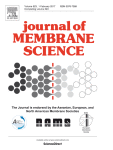 Authors: Álvaro A. RAMIREZ-SANTOS², M. BOZORG¹²³, B. ADDIS¹, V. PICCIALLI³, C. CASTEL², E. FAVRE²
Authors: Álvaro A. RAMIREZ-SANTOS², M. BOZORG¹²³, B. ADDIS¹, V. PICCIALLI³, C. CASTEL², E. FAVRE²
Affiliations: ¹Université de Lorraine, CNRS, LORIA, F-54000 Nancy, France; ²Université de Lorraine, CNRS, LRGP, F-54000 Nancy, France; ³Dipartimento di Ingegneria Civile e Ingegneria Informatica, Universitá degli Studi di Roma Tor Vergata, viale del Politecnico 1, 00133 Rome, Italy
Reference: Ramírez-Santos, Á. A., Bozorg, M., Addis, B., Piccialli, V., Castel, C., & Favre, E. (2018). Optimization of multistage membrane gas separation processes. Example of application to CO2 capture from blast furnace gas. Journal of Membrane Science, 566, 346–366.
Abstract: “A Global Optimization approach of membrane gas separation processes, based on a general process superstructure including a wide array of possible configurations, and solved by a Nonlinear Programming formulation is presented. The capacity of the proposed approach to provide optimal configurations at minimum separation cost is first validated by comparing the obtained solutions with those of a reference study in the domain. The optimization approach is then applied to the optimization of CO2 capture from blast furnace gas considering multistage processes with up to four membrane stages. The optimal process configuration and main process variables, upstream and downstream pressure and membrane area, are determined for processes with CO2 recoveries of 90%, 95% and 99% and N2 residual contents of 1%, 0.5% and 0.1%…”
DOI: 10.1016/j.memsci.2018.08.024
Comments: the authors report that each membrane process configuration resulting from optimization was compared to simulations performed at the same conditions by means of MEMSIC implemented in Aspen Plus V8.6 environment through the CAPE-OPEN standard. So the authors are making use of a CAPE-OPEN Unit Operation within Aspen Plus V8.6.
